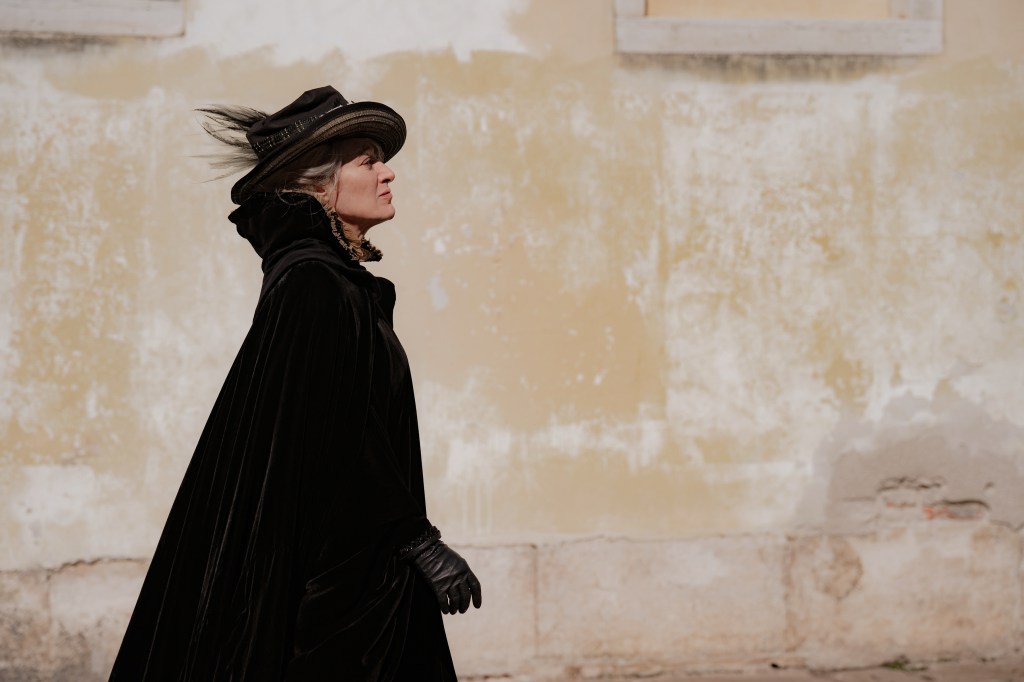As the curtain rises on Pietro Marcello’s handsome but very culturally specific biopic, the legendary Italian actress Eleonora Duse has been in retirement since 1909. Such is her enduring fame that she still draws a crowd when entertaining the troops during the First World War, and the film’s star, Valeria Bruni Tedeschi, rises to that challenge, playing her as a grouchy kind of 19th-century Italian Meryl Streep. Audiences in the know will appreciate the effortless gravitas she brings to the role, but, while it’s certainly no Mommie Dearest, there’s also perhaps unintentional streak of camp that creeps in later, when Duse’s parenting skills turn out to make her more like Joan Crawford.
We meet Duse when she has withdrawn from the stage so vehemently that she’s almost forgotten who she is (“I don’t even know if I’m still an actress,” she sighs). On top of that, she is suffering from tuberculosis and in no fit state to make a comeback; indeed, her Austrian assistant is trying to persuade her to visit a sanatorium in Davos and chill the hell out. But even if she wanted to go, Duse can’t — the Bank of Berlin has collapsed, taking all her savings with it. The shock of that, plus the seriousness of the T.B., almost kills her, but she awakens from a brief coma with a new passion for life (“I felt death brush past me”).
Duse’s immediate response is to return to the stage and the world of Henrik Ibsen, one of her favorite writers. “The Lady From the Sea has returned!” she enthuses and immediately assembles a production of Ibsen’s play of the same name, in which she plays Ellida, the heroine. The prep is quite intense, resulting one of the best rehearsing-a-scene sequences since Mulholland Drive (itself inspired by Sunset Boulevard). But when opening night comes round, Duse realizes that her daughter will be in the audience. “I can’t do Ellida in front of my daughter,” she gasps, very theatrically, leaving her assistant to do the dirty work and banish the poor woman (and her two kids) from the building.
The play is a hit, of sorts, or so Duse thinks. Afterwards, the legendary Sarah Bernhardt stops by her celebratory dinner, but not to offer her congratulations. It was like “a museum where time has stopped,” she notes, citing the recent conflict. “Love changed, dreams changed. Everything changed after this war.” Bernhardt’s harsh words are a wake-up call, so she bankrolls a pretentious play called Hecuba of the Trenches, an avant-garde production that looks like a Ken Russell dream sequence and results in the audience showering the stage in fruit and veg — which we all take to the theater, just in case — shouting, “We want the classics!”
Throwing the playwright under the bus, Duse becomes obsessed with her dream of creating “a temple for the theater” and returns to one of her other favorite writers: Gabriele D’Annunzio, who has emerged from the war as a hero and, while he disavows the rise of fascist leader Benito Mussolini, his nationalist views don’t exactly rock the boat with Mussolini and his Blackshirt bully boys. Though Duse will die before the Second World War, when Il Duce finally showed his true colors on the world stage, she ignores the almost Day-Glo red flags that surround him and falls into his “butterfly net”, much to the horror of her acolytes (to say much more than that would rob the film of its few, very low-key surprises).
Built around an all-in performance by Tedeschi, who repeatedly seems on the brink of going full Nicolas Cage but always pulls back at the last moment, Duse is an enjoyable but somewhat opaque take on an enigmatic Italian legend. It’s fine for the actor to play her myriad contradictions, but for those unfamiliar with Duse’s story it’s hard to know what Marcello is trying to say about her. Was she vain? Was she deluded? Or was she a genuine genius, a century ahead of her time? Thankfully, Tedeschi is a powerhouse in that respect — maybe she’s all three. In the long run, though, Duse is mostly a stylish stream of scenes from a life, however fabulously and strangely that life was lived.
Title: Duse
Festival: Venice (Competition)
Director: Pietro Marcello
Screenwriters: Letizia Russo, Guido Silei, Pietro Marcello
Cast: Valeria Bruni Tedeschi, Fanni Wrochna, Noémie Merlant, Fausto Russo Alesi, Edoardo Sorgente, Vincenzo Nemolato, Noémie Lvovsky
Sales agent: The Match Factory
Running time: 2 hrs 5 mins
This article was published by Damon Wise on 2025-09-04 03:00:00
View Original Post





